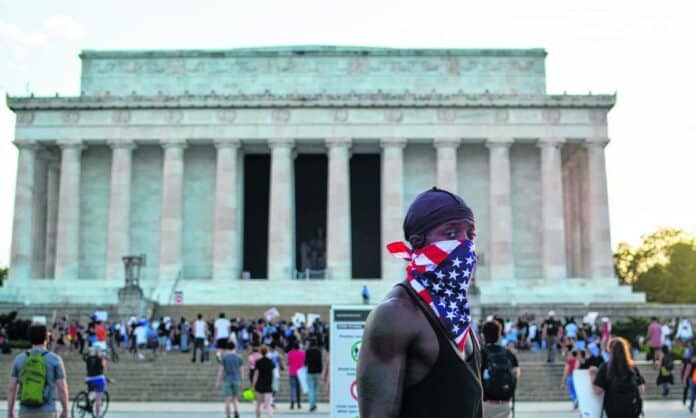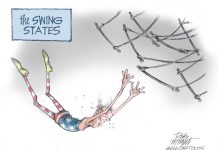
By Brittany Talissa King
The world is shouting the name of George Floyd, sparking an outbreak of protests across the globe.
In America–from Minneapolis, where he died, to southern Georgia, across the east and west coasts, jumping abroad to Berlin, Germany, and London, England. Even though we’re still fighting COVID-19, millions of citizens have braved the streets against our other pandemic which evolved 400 years ago.
A surge of video recordings has again documented racial violence against black Americans. And unfortunately, the police officer suffocating George Floyd wasn’t the only one. In Georgia, a father and son hunted down 25-year-old Ahmaud Arbery as he jogged. In Kentucky, the Louisville Metro Police raided the wrong home, killing Breonna Taylor, a 26-year-old EMT. In Indianapolis, two IMPD officers were caught on a Facebook Live video laughing after killing Dreasjon Reed. Then in Central Park, a racial threat toward Christian Cooper showed, in no relation, Amy Cooper’s premeditation to demonize his blackness saying, “I’m gonna’ tell them an African-American man is threatening my life!”
[sc:text-divider text-divider-title=”Story continues below gallery” ]
Even if you haven’t watched those videos, you’ve heard those names.
It’s nearing 100 days since the federal stay-at-home order, and now America is slowly integrating again. But after watching the racial violence that’s transpired since April, maybe this federal shutdown needs an extension.
In the last few days, I’ve watched social media flood with posts hash-tagging #BlackLivesMatter and others denouncing the demonstrations–calling the protesters “thugs,” while others pointed out the hypocrisy for damning Colin Kaepernick’s kneel, but not the one on top an American’s neck.
Now that we’re quarantined, we are almost forced to pay attention to the news. And in the news, a plethora of inarguable truths has uncovered underlying racial disparities in our country—specifically within our healthcare system and the criminal justice one.
However, another invisible entity has reemerged, which plagued America before COVID-19.
Let’s go back, when African people were embezzled by European settlers to make a stolen America great. These settlers’ absence of humanity bred this racial contagion, which continues to be captured in videos today. This is our other 1619 pandemic. It’s called RACISM-19.
When COVID-19 first appeared in January, it was not met with urgency. After it infected the first American in the state of Washington, it still was disbelieved as a national threat.
But after the total rose from one man to over 30,000 Americans in a month, a state-of-emergency was issued, forcing us to stay home. In the same vein, after Ahmaud was killed, the racial incidents following sparked a novel believability that police brutality and racial disparities are real–causing Americans to reflect back to the other black lives they ignored.
Even though RACISM-19 has systemically infected the nation’s citizens, the institutions they’ve built, and the systems in which the country functions—it’s yet to be declared a national epidemic. Instead, our government officials and president ignore it. Ignorantly believing it died in 1863. A sentiment praised in a 2017 tweet during Black History Month, where Vice President Mike Pence wrote, “We remember when President Lincoln submitted the 13th Amendment, ending slavery, to the states #NationalFreedomDay.”
But, RACISM-19 did not expire after a law passed (i.e., the Emancipation Proclamation and the Civil Rights Bill). Like COVID-19, it stayed persistent, awaiting more bodies to destroy.
In the early stages of COVID-19, we learned the elderly, individuals with underlying health issues, and minorities of black and Hispanic descent are more susceptible to the disease.
Additionally, we understood the virus was airborne, so if we stayed inside, wore masks, and sanitized everything we touch—we could help lower the curve. And almost a half-millennium later, RACISM-19 has still spread, and has found ways to survive in white supremacy, bigotry, prejudice, and silence. But, there’s yet been a mandated approach to stop it’s incline. And the asymptomatic carriers who spread it continued to infect blacks and Hispanics who, again, are most likely to die from it.
That sounds like a state-of-emergency to me.
So, here begs the question, what if America took white supremacy as serious as COVID-19? What if we treated implicit bias, bigotry, and prejudice like infections? If you showcase these symptoms, one must internally quarantine inside anti-racist material until better. RACISM-19 has surely killed more Americans and continues to multiply hosts like Officer David Chauvin, Amy Cooper, and Gregory and Travis McMichael.
And here’s the thing, we took remarkable precautions to fight COVID-19. We literally closed our cities, our schools, and workplaces. We shut-down millions of our freedoms: dining out, going to the movies, exercising at the gym, hanging out at local bars, and worshiping in our churches. Let’s not forget that we canceled the NBA, our NFL Sundays, and the 2020 Olympic Games. Heck, we even got New York City to sleep. We nearly collapsed our economy for our well-being, for our health, so that we could stay alive.
Do you not see our vigilance? Is it really impossible for us to band together against a racial divide? Is it really extreme that marginalized Americans are telling the truth when they’re shouting, “I can’t breathe!”
It just takes a collective choice to begin a racial shut-down—no social distance or quarantine required—just a moral decision. Do we want to be free or not? One thing is certain; America will never be the same. And this country will reopen, and the racial climate will continue to climb. I think it’s about time we flatten the curve.
Brittany Talissa King, a Columbus native, is a freelance writer and recent graduate from New York University where she received her Master’s in Journalism (Cultural Reporting and Criticism). She’s passionate about exploring American racial issues through essays and her podcast #AmericanShade. King founded the Columbus chapter of Black Lives Matter, which disbanded in 2018 after two-and-a-half years of operation. She currently lives in Brooklyn. Send comments to [email protected].




